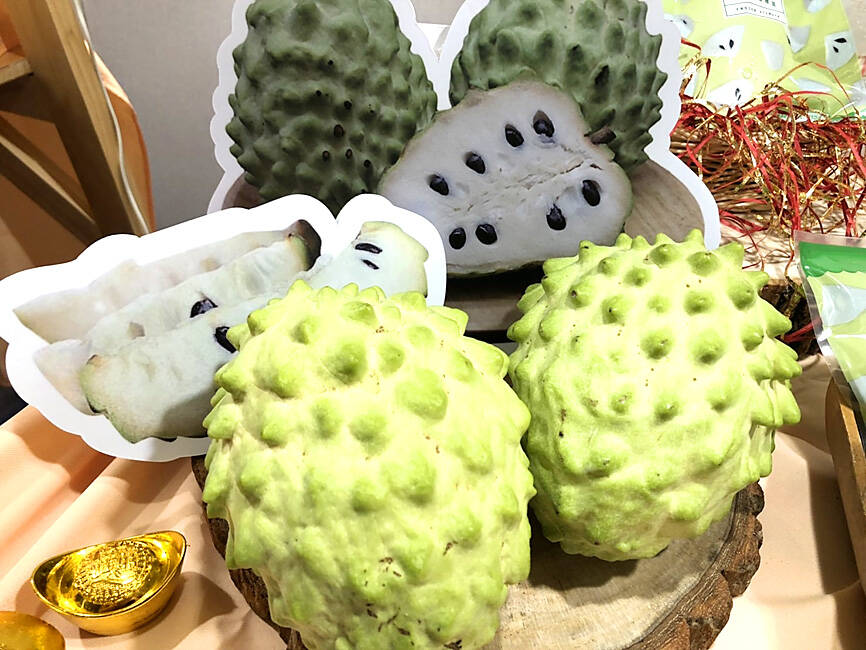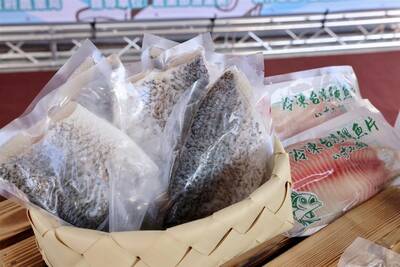Beijing reportedly plans to lift an import ban on Taiwanese atemoya later this month, following visits to China by current and former Chinese Nationalist Party (KMT) officials, a person with knowledge of the matter said last week.
Former president Ma Ying-jeou (馬英九) concluded a visit to China early this month, while KMT Vice Chairman Andrew Hsia (夏立言) in February traveled there in part to negotiate with Beijing on behalf of Taiwanese businesses affected by the ban.
The Chinese government has over the past two years suspended the importation of hundreds of Taiwanese products, citing the presence of pests and improper applications.

Photo: Yang Yuan-ting, Taipei Times
Atemoya, a hybrid of custard apple and cherimoya, was among the first products banned in 2021, along with pineapples and wax apples, which at the time constituted Taiwan’s top three fruit exports to China.
The moves have been widely interpreted as politically motivated and Taiwan’s representative to the WTO has filed multiple complaints seeking mediation.
Speaking on condition of anonymity, a KMT official said that Beijing is planning to lift the atemoya ban later this month at the earliest.
The “united front” strategy is attractive to Beijing, as it only needs to “inject the poison, then provide the antidote,” the official said on Monday last week.
It can then funnel the positive publicity toward the KMT to boost its chances in next year’s presidential election, they added.
After Hsia met with Chinese Politburo Standing Committee member Wang Huning (王滬寧) and Taiwan Affairs Office Director Song Tao (宋濤) in February, the office said it was “willing to work with the relevant parties in Taiwan to help restore imports of Taiwanese agricultural and fishery products.”
Government representatives from Taitung County — a major atemoya growing region — also visited China late last month to seek the resumption of imports.
According to a March 28 report by Hsia to KMT Chairman Eric Chu (朱立倫) on the county delegation, the manager of the Taiwan branch of China Inspection Co and two experts were on March 30 to inspect atemoya orchards, packaging and transportation in the county.
If their findings meet the standards of the Chinese General Administration of Customs, the ban on atemoya imports would be lifted, likely in the second half of this month, Hsia reportedly said.
Another anonymous official last week said that Chu would wait until Beijing lifts the ban to announce the news in tandem with the Taitung County Government.
The KMT hopes to use the development as a model to negotiate the lifting of similar bans and boost its credentials as a party capable of solving problems facing farmers and fishers, they said.
Chu reportedly asked Hsia not to visit China for a while after his delegation returned to Taiwan, on concern that more visits might affect the party’s chances in next year’s election, the person said, adding that exchanges were to be conducted solely through the KMT’s Mainland Affairs Department.
However, seeking to consolidate his position as the KMT’s main cross-strait negotiator, Hsia has repeatedly asked the department to visit China on behalf of Taiwanese businesses, although Chu has yet to agree, the person said.
Hsia believes that the KMT should take advantage of China’s willingness to engage in cross-strait exchanges and Taiwanese’s desire for peace to regain control of cross-strait relations, the person said.
Beijing would undoubtedly interfere in next year’s election on behalf of the KMT, particularly through similar “cost-free” tactics, the person said.
However, it was China that concocted the “pest” problem in the first place, only to later play the role of the benefactor, they added.

Taiwan's Vice President Hsiao Bi-khim (蕭美琴) said Saturday that she would not be intimidated by the Chinese Communist Party (CCP), following reports that Chinese agents planned to ram her car during a visit to the Czech Republic last year. "I had a great visit to Prague & thank the Czech authorities for their hospitality & ensuring my safety," Hsiao said on social media platform X. "The CCP's unlawful activities will NOT intimidate me from voicing Taiwan's interests in the international community," she wrote. Hsiao visited the Czech Republic on March 18 last year as vice president-elect and met with Czech Senate leadership, including

There have been clear signs of Chinese Communist Party (CCP) attempts to interfere in the nationwide recall vote on July 26 in support of Chinese Nationalist Party (KMT) legislators facing recall, an unnamed government official said, warning about possible further actions. The CCP is actively involved in Taiwanese politics, and interference in the recall vote is to be expected, with multiple Chinese state media and TAO attempts to discredit the Democratic Progressive Party (DPP) and undermine public support of their recall movement, the official said. This interference includes a smear campaign initiated this month by a pro-Beijing Hong Kong news outlet against

A week-long exhibition on modern Tibetan history and the Dalai Lama’s global advocacy opened yesterday in Taipei, featuring quotes and artworks highlighting human rights and China’s ongoing repression of Tibetans, Hong Kongers and Uighurs. The exhibition, the first organized by the Human Rights Network for Tibet and Taiwan (HRNTT), is titled “From the Snowy Ridges to the Ocean of Wisdom.” “It would be impossible for Tibetans inside Tibet to hold an exhibition like this — we can do it. because we live in a free and democratic country,” HRNTT secretary-general Tashi Tsering said. Tashi Tsering, a Taiwan-based Tibetan who has never

A first shipment of five tons of Taiwan tilapia was sent from Tainan to Singapore on Wednesday, following an order valued at NT$600,000 (US$20,500) placed with a company in the city. The products, including frozen whole fish and pre- cooked fish belly, were dispatched from Jiangjun Fishing Harbor, where a new aquatic processing and logistics center is under construction. At the launch, Tainan Mayor Huang Wei-che (黃偉哲) called the move a “breakthrough,” marking Taiwan’s expansion into the Singaporean tilapia market. Taiwan’s tilapia exports have traditionally focused on the United States, Canada, and the Middle East, Huang said, adding that the new foothold in